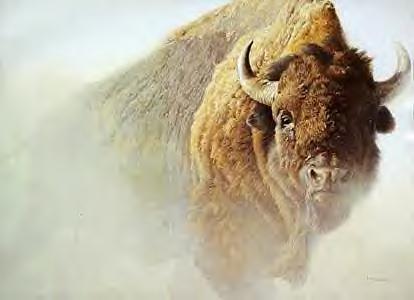|
 RED
LAKE, Minn. -- On a desolate farm in the northwestern corner of the Red Lake Reservation, the thundering of buffalo
hooves can once again be heard. RED
LAKE, Minn. -- On a desolate farm in the northwestern corner of the Red Lake Reservation, the thundering of buffalo
hooves can once again be heard.
Five Red Lake men brought the buffalo back to the reservation to help restore a once-natural diet and to heal decades
of spiritual wounds.
"We're doing our part to ensure the buffalo will always be here," said Joe Johnson, one of the men who
formed Red Lake Bison Inc. to bring the buffalo back to Red Lake.
"You know, Indian people have also almost come to that same state of extinction (as the buffalo). Hopefully,
together we can learn to survive," Johnson said.
The six buffalo were brought to the pasture on the Dean Wilkens farm in Red Lake May 28, concluding about a year
of preparation by the group and a lifetime's fascination for one man.
Harold Donnell, 50, whose dream inspired Red Lake Bison Inc., graduated from Red Lake High School in 1968 and took
a job with the reservation's natural resources program.
The dream of bringing the buffalo home to Red Lake began when Donnell was put to work along the Clearwater River
in the western part of the reservation.
Donnell discovered bones and skulls that proved buffalo had once inhabited the mostly wooded reservation and learned
there were historical buffalo sites all across the reservation.
"I tried seriously making contacts eight to 10 years ago, but nothing ever developed," he said.
About two years ago, he got his lifetime friend Johnson interested in the project. They soon enlisted the help
of Harold's brother, Henry Donnell; Sewn Baker and Clifford Martell.
The men set out to learn as much as they could about buffalo, visiting Buffalo ranches around North Dakota and
stopping by the North American Buffalo Association in Rockwood.
At the end of May, the group bought six buffalo -- a bull and five cows -- from a ranch in Warroad and brought
them back to Red Lake.
"Something that seemed so impossible in our minds was happening for real," Henry Donnell said. "They
took off out of that trailer, ran about 30 feet and they stopped and they ate. They knew they were home."
As many as 60 to 75 million buffalo once roamed most of North America, from the Rockies to the eastern coast and
from Canada's Hudson Bay to the state of Georgia, experts estimate.
By 1880, poachers were hunting buffalo even on government-protected land, and when poachers killed four buffalo
in 1897 near Lost Park, Colo., they likely killed the last unprotected free-ranging herd in the country.
Today, one of the only wild herds of buffalo left in the nation is in Yellowstone National Park.
The owners of Red Lake Bison Inc. hope to build the herd, adding 200 to 300 head in the next three to five years.
Through grants and programs such as the InterTribal Bison Cooperative, a nonprofit Indian organization that helps
tribes build buffalo herds, they envision hundreds of acres supporting hundreds of buffalo on the
reservation's western plains.
As the herd grows, the owners would like to add the extra lean buffalo meat to the diet of Red Lake members, helping
to ease the high rates of diabetes and cardiovascular problems.
The owners also would like to create a nonprofit subsidiary corporation called Mashkode Bishikiwug, meaning Prairie
Fire Bull. The goal would be to take Indian youths who are in trouble with the law and house them at the buffalo
ranch in an effort to restore their connection to the Indian culture.
Finally, they say, the Red Lake Band of Chippewa will grow stronger, relying on the spiritual strength of an animal
with which Indians lived harmoniously for thousands of years.
"It's more than just raising the animals and selling the meat," local grant writer Kathleen O'Kelley
said. "It has to do with that relationship that Indian people have with the buffalo, other animals and the
natural world."
Learn more about the Intertribal Bison Cooperative:
Intertribal Bison Cooperative
http://www.intertribalbison.org/intertribalbison.htm
|
 RED
LAKE, Minn. -- On a desolate farm in the northwestern corner of the Red Lake Reservation, the thundering of buffalo
hooves can once again be heard.
RED
LAKE, Minn. -- On a desolate farm in the northwestern corner of the Red Lake Reservation, the thundering of buffalo
hooves can once again be heard.